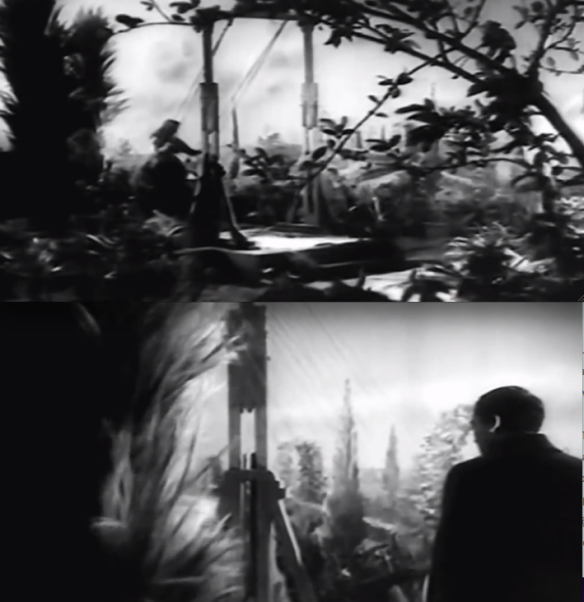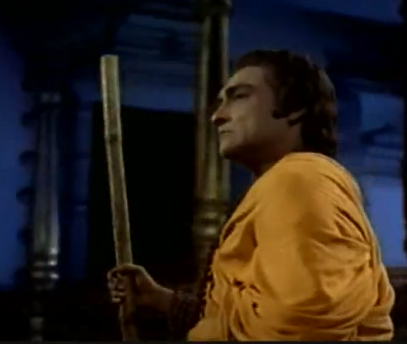Today we showcase the haunting lyrics and English translation of “Aayega Aanewala” from Kamal Amrohi’s Mahal (1949). The film is a landmark in the history of Indian cinema, representing a visionary shift to director-focused auteurism that ushered in India’s Golden Era of filmmaking. Upon its release, director Kamal Amrohi shot to super-stardom along with the then unheard of songstress Lata Mangeshkar and the enchanting teenage Madhubala. A quintessential Bollywood ghost story, Mahal tells the tale of businessman (Ashok Kumar) who inherits a palace in Allahabad and discovers that it is haunted by his lover in a previous life (Madhubala).
With its famous opening chimes of an echoing grandfather clock, “Aayega Aanewala” is a cinematographer’s fantasy, stringing one beautiful image of surrealist delusion after another. From the revealing dolly-shot, shrouded by branches, of a shadowy woman on a swing with a dupatta that chases the wind to the wide shot of a an empty ballroom whose chandelier rocks back-and-forth from an unseen presence, German-born cinematographer Josef Wirsching infuses an intoxicating wonder into each shot that is as much frightening as it is gorgeous. Traces of that languid hallucinatory world he constructs can be seen in his later work, Pakeezah (1971).

Above: The ethereal Madhubala is found swinging below in the palace gardens. Below: By the time Ashok Kumar approaches, the swing is empty, swaying eerily in the breeze.
At the age of 22, Kamal Amrohi arrived in Bombay with nothing but Rs. 17 and his own creativity. He wrote for a few films such as Shahjahan (1946) with the help of K.L. Saigal who became his supporter. Originally paid to simply write the script for Mahal, Amrohi insisted that he be allowed to direct as well. After much dispute the legendary Bombay Talkies studio relented–and made Bollywood history.
When recording the song “Aayega Aanewala” in the large empty Bombay Talkies studio, Amrohi had Lata Mangeshkar stand 20 feet away from the microphone when she sung the song’s opening notes. With each few words, she took another step closer until she reached the microphone for the chorus “Aayega, aayega, aayega.” They rehearsed this multiple times until they achieved the sound he desired. The effect was to capture the echoing nature of a voice floating through the large palace. With Lata’s angelic voice and Madhubala’s ghostly grace, the haunting femme fatale was created. Bimal Roy, who worked as an editor on the film, later drew upon Mahal‘s establishment of the Indian film noir genre when directing his own acclaimed Madhumati (1958).
If for no other reason, you’ve got to see this film just to be amazed at what Madhubala looked like as a teenager. I definitely didn’t look like that when I was 16 (although apparently Vyjayanthimala did). We dedicate this translation to our yesteryear fan Satya Khanna! Be sure to watch the film’s beautiful cinematography here as you follow along with our lyrics and English translation of “Aayega Aanewala” below!
Aayega Aanewala Lyrics and English Translation:
Khaamosh hai zamaanaa, chhup-chhaap hai.N sitaare
The earth is silent, the stars are quiet
Aaraam se hai duniyaa, bekal hai.N dil ke maare
The world is at rest, but the lovers are restless
Aise mei.N koii aahaT is tarah aa rahi hai
In the stillness, footsteps are approaching like this
Jaise ki chal rahaa hai man mei.N koi hamaare
As if someone is passing through my soul
Yaa dil dhaDak rahaa hai? ik aas ke sahaare
Or is it only my heart that is beating? I have this one hope for support
Aayegaa, aayegaa, aayegaa
He will come, he will come, he will come
Aayegaa, aayegaa, aanewaalaa
He will come, he will come, he who is to come
Deepak baghair kaise, parwaane jal rahe hai.N?
How are the moths burning without a flame?
Koi nahii.N chalaataa, aur teer chal rahe hai.N
No one fired, yet an arrow is flying
TaDpegaa koii kab tak, be-aas be-sahaare
How long will someone be tormented, without hope and without support?
Lekin yeh keh rahe hai.N dil ke mere ishaare
Yet the signals of my heart are saying
Aayegaa, aayegaa, aayegaa
He will come, he will come, he will come
Aayegaa, aayegaa, aanewaalaa
He will come, he will come, he who is to come
BhaTkii huii jawaanii manzil ko DhoonDhti hai
My wandering youth is searching for a destination
Maajhi baghair nayyaa, saahil ko dhoondhti hai
As if a boat without an oarsman searches for the shore
Kyaa jaane dil ki kashTii, kab tak lage kinaare
What does the boat of my heart know of how long until we reach the river bank
Lekin yeh keh rahe hai.N dil ke mere ishaare
Yet the signals of my heart are saying
Aayegaa, aayegaa, aayegaa
He will come, he will come, he will come
Aayegaa, aayegaa, aanewaalaa
He will come, he will come, he who is to come
Glossary:
khaamosh: silence; zamaanaa: earth; chhup-chhaap: quiet; sitaraa: star; aaraam se: restful; duniyaa: the world; bekal: restless; dil ke maare: lovers; aahaT: footsteps; man: heart, soul; dhaDaknaa: to beat [heart]; aas: hope; sahaaraa: support; deepak: flame; [kisi ke] baghair: without; parwaanaa: moth; jalnaa: to burn; taDapnaa: to be tormented; be-aas: without hope; be-sahaaraa: without support; ishaaraa: signal, symbol; bhaTaknaa: to wander; jawaanii: youth; manzil: destination; DhoonDnaa: to search; maajhi: oarsman; nayyaa: boat; saahil: shore; kashTii: boat; kinaaraa: [river] bank
Now that that’s over, let’s take a brief moment to discuss ye olde moth and flame analogy. A favorite fall-back of Hindi film lyricists, the analogy of a kamikaze moth yearning for unity with fire has intrigued many a Bollywood romantic. With roots in Sufi mysticism, the classic moth and flame analogy has been lovingly immortalized by everyone from Rumi to Charles Dickens.
At its essence, the male lover (or metaphorical moth) is so blinded by love for a woman (the metaphorical flame), that he is willing to burn and die in order to join her. Very well. But in Bollywood, the analogy is so abused, the mere drop of the word parwaanaa in any context can denote a sinister Fate without even going into mention of the flame and burning alive. Interestingly, in the lyrics to “Aayegaa Aanewala“, the poet Nakshab Jarchavi constructs a fascinating twist on the hackneyed metaphor: instead of the male representing the moth, he represents the flame in whose absence our heroine is suffering! I love a good poetic gender role reversal. Is it getting hot in here, or is it just me?
-Mrs. 55

Ashok Kumar cleverly burns his hand with his cigarette to check if he is dreaming. Yeah, no. He’s still awake.













